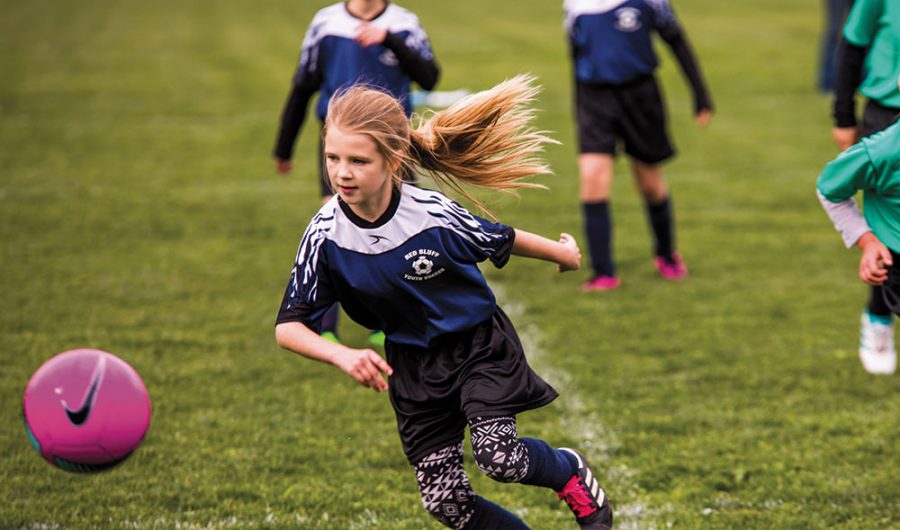
Photo by Web Made Local
Parents want their kids to have an active and healthy lifestyle, and many sign them up for sports hoping to help them develop healthy lifelong habits and a love for physical activity. Sports can be a great fit for kids who have ADHD, or a sensory processing disorder or who struggle with socialization disorders. They also promote heart health, good exercise habits, and good sportsmanship and help develop friendships. Individual and team sports help kids stay active while building self-esteem and focus.
When deciding which sport to try, take into consideration your child’s strengths and weaknesses. Is your child drawn to social situations, or does she tend to be more introverted? Does your child thrive when allowed to work as part of a team, or is he good at setting and meeting goals for himself? What physical strengths does she possess? Does your child have great hand-eye coordination, or is he quick on his feet, flexible or have great balance and strength? Take these things along with each child’s interests interests into consideration as you choose a sport to try.
Baseball
Playing baseball promotes hand-eye coordination and is a great team sport. It encourages friendships and teaches kids to support and cheer on teammates. It is also a fun sport for families to play in the backyard or enjoy as spectators.
Basketball
Starting basketball at a young age can help kids develop their motor skills. Learning to dribble, pass, catch, pivot and shoot the ball will help them develop important gross motor skills. They will also develop hand-eye coordination and learn how to work together as a team.
Bowling
One of the biggest benefits of bowling is that you are never too young or too old to join a bowling team. There are leagues for any age. Kids who bowl will experience both the benefits of individual sports and the camaraderie that goes along with participating on a team.
Cheerleading
Kids that participate in cheerleading will not only have the benefit of strengthening their muscles, increasing flexibility and working as a team, but they will also need to remember routines and gain self-confidence as they cheer and perform in front of a crowd.
Climbing
Rock climbing is a great sport for kids who are uninterested in other sports. It not only builds strength, coordination and flexibility but it also helps build mental focus. Kids who struggle to focus in school situations may find that climbing can help them develop and improve this skill. Many indoor climbing facilities offer after-school climbing clubs with instruction for new climbers.
Gymnastics
Gymnasts are known for their strength, coordination, flexibility and discipline. Your child may never become an Olympic gymnast, but the confidence and agility they will learn from participating in gymnastics will stick with them.
Horseback Riding
Horseback riding is a fun sport that you never outgrow. Learning to ride a horse takes balance and strength. It is also a great source of exercise. Kids who enjoy nature, being outdoors, working with animals and the opportunity to learn new things will love this sport.
Hockey (Ice and Roller)
Skating is a great cardio workout that works the whole body. Kids who play hockey will fine-tune their physical strength, balance and endurance. They will develop hand-eye coordination and learn to work as a team. Because hockey is a physical sport, they will learn healthy boundaries, respect and become more comfortable in their bodies.
Lacrosse
Lacrosse is another great team sport that involves hand-eye coordination and teamwork. It also encourages kids to be observant and alert during games as it is fast-paced. These skills also will serve them well in other areas in their lives.
Martial Arts
Kids who want to learn discipline, respect for others and themselves, balance and coordination, self-control and listening and focusing skills should consider trying martial arts. This can also become a family sport as all ages are welcome in this activity.
Running
While running sports typically start in late elementary school or middle school, it is never too early or late to enjoy. Besides providing a great cardio workout, running helps develop physical, mental and personal development as kids overcome challenges and set new goals in distance or time.
Skiing (Water and Snow)
Kids who ski will develop great body awareness because even the slightest movement can change their momentum and balance. Skiing also helps develop good joint strength, balance, strength of the lower extremities and confidence. If you have a child that is a bit of a thrill seeker, skiing may be a good sport to try.
Soccer
Not only is soccer a great physical workout, but it is also a social sport. Kids who tend to be shy in other situations are forced to step out of their comfort zone as they battle for control of the ball. Soccer teams often become close-knit groups because of the teamwork involved, and this helps promote support for each other and friendships.
Swimming
Swimming is a great source of cardiovascular exercise. It also promotes strength, stamina, balance, better posture and teaches water safety. Swimming, like martial arts, is a sport for all ages. A love of a sport like swimming can turn into a lifetime source of exercise and enjoyment.
Tennis
Hand-eye coordination, speed, agility, gross and fine motor skills and strong cardiovascular exercise makes tennis a great option for kids who like to keep moving, are quick on their feet and want the individual attention that comes from one-on-one coaching.
Volleyball
Volleyball is a great workout for both the upper body and lower body and promotes hand-eye coordination and teamwork. The sport also demands focus, endurance and agility. Players will be expected to be quick on their feet and make fast-paced decisions.
Some kids may find that team sports are not a good fit and will seek out individual sports and benefit from one-on-one coaching and the experience of competing against themselves. If none of the above sports are of interest, you may also want to research fencing, wrestling, cycling, dance, diving or golf. Many of these sports allow kids to compete on an individual basis while contributing overall to a team. For example, kids competing in gymnastics will receive an individual score, but the points go to an overall total for the team. This gives kids the support from teammates without the pressure of having to play on a team. Kids will learn to set and exceed their personal goals and have the camaraderie that goes along with a team sport. If you notice your child is feeling pressure or frustration from participating in team sports, give an individual sport a try.
On the other hand, team sports have a lot of benefits as well. Kids who enjoy engaging socially with others that have common interests will love the bonding that can form as teammates compete and cheer each other on. Kids who participate in team sports will learn the value of teamwork, make friends outside of school, experience good sportsmanship, learn about diversity and benefit from character building that goes along with winning and losing and being part of a team.
Posted in: Health & Nutrition
Comment Policy: All viewpoints are welcome, but comments should remain relevant. Personal attacks, profanity, and aggressive behavior are not allowed. No spam, advertising, or promoting of products/services. Please, only use your real name and limit the amount of links submitted in your comment.
You Might Also Like...

Redding Midwifery: Providing Safe, Family-Centered Pregnancy and Childbirth Options
Our ultimate goal is to help you have a healthy, safe and rewarding birth experience,” says Naomi Bjorgan, LM, CPM, founder and owner of Redding Midwifery, a business which provides […]

What Parents Need to Know About Concussions
As young athletes are donning their helmets and pads for fall sports practice, many parents might feel conflicted about cheering them on. This spring, the family of Tyler Hilinski, the […]

Understanding Dyslexia
Sitting with a small group of second graders, listening as each took a turn reading aloud, it struck me how reading came so easily for some and with such difficulty […]

Not Just for Taco Tuesday – Salsas Spice Up Any Day
As a staple on most tables for Taco Tuesdays, salsa is one of my favorite condiments. The blend of peppers, spices and tomatoes, with just the right amount of heat […]




